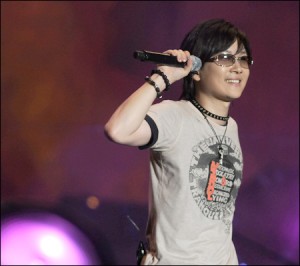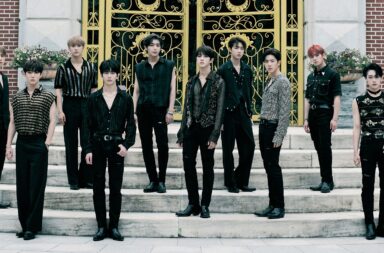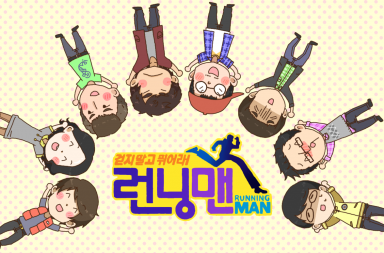 It’s 1995, and Seo Tai-ji is asked by a fan what he would do for his fans when he meets them on his 20th anniversary since debut. His reply? That he would buy them coffee.
It’s 1995, and Seo Tai-ji is asked by a fan what he would do for his fans when he meets them on his 20th anniversary since debut. His reply? That he would buy them coffee.
Fast forward 17 years, and Seo Tai-ji is making quite the comeback to the Korean music scene. Not only has he upheld his promise, setting up a travelling coffee shop which is serving the beverage for any fan that is able to present some form of Seo Tai-ji memerobilia from the last 20 years until the 9th of December, Seo’s also been quick to set up official Facebook, Twitter and YouTube accounts: my own Facebook news feed is currently filled with updates about coffee. Seo has been using technology to his advantage to spread news about his recent activities, which also happens to include recording a MV for previously released song “Coma.”
This sudden flurry of activity does seem to hint heavily at a comeback for Seo Tai-ji, his grand reentrance to the Korean music scene. But while this may be a comeback in a tangible sense, Seo Tai-ji has, as the “godfather of K-pop,” been at the root of many of the things that influence K-pop and the wider Korean music market to this day.
 Born Jeong Hyeon-Cheol in 1972, he took on the stage name of Seo Tai-ji when he was drafted into metal band Sinawe in 1990. Sinawe disbanded the next year, but this didn’t stop Seo; inspired by his discovery of and interest in MIDI technology, he brought together dancers Lee Ju-no and Yang Hyun-suk (known to us today as the YG of YG Entertainment) to create Seo Taiji and the Boys. The trio initially performed dance pop songs with rapping, as seen in their debut single “Nan Arayo” (I Know).
Born Jeong Hyeon-Cheol in 1972, he took on the stage name of Seo Tai-ji when he was drafted into metal band Sinawe in 1990. Sinawe disbanded the next year, but this didn’t stop Seo; inspired by his discovery of and interest in MIDI technology, he brought together dancers Lee Ju-no and Yang Hyun-suk (known to us today as the YG of YG Entertainment) to create Seo Taiji and the Boys. The trio initially performed dance pop songs with rapping, as seen in their debut single “Nan Arayo” (I Know).
Seo Taiji and the Boys were by no means the first to perform such dance oriented routines in the then rock band and ballad singer dominated music scene (one example being So Bang-cha and his own two boys, active between 1988 and 1990), but the unexpected and widespread success of “Nan Arayo” greatly influenced the direction mainstream Korean music took from that point on. It not only introduced contemporary sounds of urban and new Jack swing from the US into the Korean zeitgeist, but also the energetic dancing we can see in today’s pop groups. And I’m not kidding about the energetic part, check out their moves (especially YG’s):
“Nan Arayo” was especially popular amongst Korean youth, which experts say led to a shift in focus from older audiences to younger, as well as performers. The current, often baby-faced idol groups have followed the dance-based performance style well, and they also continue to toy with image changes–but few, if any, groups have managed to make as drastic a change as Seo Taiji and the Boys. The third and penultimate studio album for the trio, Dreaming For Balhae, took a much darker turn, the upbeat dance pop replaced with rock and controversial lyrics, such as those in “Class Idea:”
Every day at 7:30 AM
They lock us into a tiny class room, all over the country
And into our 9 million brains
They place exactly the same things
The live performances also differed greatly between “Class Idea” and “Nan Arayo,” though there is still some dancing to be seen in the former.
 This controversial streak continued until Seo Taiji and the Boys’ disbandment in 1996, and even further when Seo Tai-ji commenced his solo career in 1998. Still maintaining his American-inspired rock sound along with metal and punk, Seo’s sophomore solo album, Ultramania, was the one which truly consolidated Seo’s solo success. This record also included the track “Internet War:” then, a warning of the dangers of cyberspace; now, the soundtrack for a very charged stage performed by SHINee‘s Jonghyun and Taemin at various SMTOWN and SHINee World concerts. Jonghyun’s inking of his fansite names on his back add a contemporary touch to a song that is as relevant as ever in the K-pop fandom.
This controversial streak continued until Seo Taiji and the Boys’ disbandment in 1996, and even further when Seo Tai-ji commenced his solo career in 1998. Still maintaining his American-inspired rock sound along with metal and punk, Seo’s sophomore solo album, Ultramania, was the one which truly consolidated Seo’s solo success. This record also included the track “Internet War:” then, a warning of the dangers of cyberspace; now, the soundtrack for a very charged stage performed by SHINee‘s Jonghyun and Taemin at various SMTOWN and SHINee World concerts. Jonghyun’s inking of his fansite names on his back add a contemporary touch to a song that is as relevant as ever in the K-pop fandom.
But it’s not just Seo’s music that was influencing his contemporaries. In mid-2011, it was revealed in spectacular fashion that Seo had been married to actress and Athena star Lee Ji-ah between the years of 1997 and 2006. With news of the marriage and divorce only surfacing when Lee took Seo to court seeking alimony. Shock at the well kept secret in addition to news of Lee’s relationship with Athena co-star Jung Woo-sung during that time in 2011 had tongues wagging and imaginations working overtime–including that of one Shinsadong Tiger. The hit-maker recently revealed on SBS TV show Strong Heart that this piece of celebrity gossip had been the inspiration for the song “Fiction.” Initially offered to ZE:A, “Fiction” instead ended up in the hands of Beast… and you know what happened next. How apt that the “reject” group was able to overcome this label and be considered artists in their own right thanks to a rejected song.
And if inspiring one of, it not THE, top song of 2011 was not enough, Seo also had a hand in discovering South Korea’s currently most well known indie band known to the mainstream audience: Nell. The band was first spotted by Seo while playing in Hongdae, who signed them to Geosoo Indigene, a subsidiary of his own agency, Seo Taiji Company.
 Seo Tai-ji has thus far released four solo studio albums, to which fans add the four Seo Taiji and the Boys albums, and count eight in total. With the trajectory of his career, Seo unconciously set the template for future idols: to debut in a group and become famous by catering to the public’s demands; if needed, successfully undergo changes to both image and sound to accommodate changing tastes or to satisfy one’s own interests; disband at the height of the groups fame, and; embark on an equally successful solo career.
Seo Tai-ji has thus far released four solo studio albums, to which fans add the four Seo Taiji and the Boys albums, and count eight in total. With the trajectory of his career, Seo unconciously set the template for future idols: to debut in a group and become famous by catering to the public’s demands; if needed, successfully undergo changes to both image and sound to accommodate changing tastes or to satisfy one’s own interests; disband at the height of the groups fame, and; embark on an equally successful solo career.
Seo has had a fortunate career thus far, and though he has not released any new material since his 8th (4th solo) studio album 8th Atomos, Seo has managed to influence the music scene in Korea in different ways, from inspiring songs, to discovering new bands to even having a tangental hand in the creation of one of K-pop’s biggest companies; his actions over the past 20 years continue to reverberate through Korean music. And now, we wait to see what Seo Tai-ji will do next: whatever it is, though, I am sure he will continue to influence and inspire a new generation of idols, musicians and music lovers.
Readers, what are your thoughts on Seo Tai-ji? Do you have any favourite songs by him? Please, do share your thoughts and comments below!
(The ChosunIlbo, enewsworld, fuckyeahseotaiji@tumblr, HanCinema, The Korea Herald, Korean Pop in History, last.fm, MTV Iggy, Naver[1][2], zboy0@YouTube)


